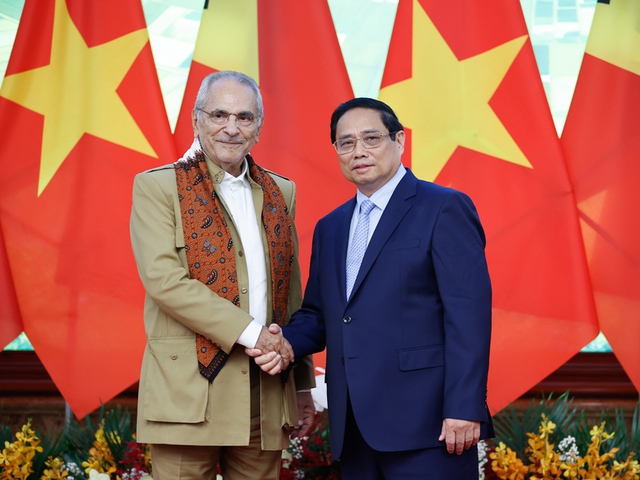Prime Minister meets President of Timor-Leste
VGP - Prime Minister Pham Minh Chinh on August 2 had a meeting with President of Timor-Leste Jose Ramos-Horta who is paying a State visit to Viet Nam.

Prime Minister Pham Minh Chinh (R) meets President of Timor-Leste Jose Ramos-Horta, Ha Noi, August 2, 2024 - Photo: VGP
Pham hailed Timor-Leste President's second visit to Viet Nam, which is of great significance, marking the journey of more than 20 years of establishing diplomatic relations, contributing to strengthening political trust and creating new momentum for bilateral ties in the coming time.
He congratulated Timor-Leste on achieving crucial achievements in its national development and the nation is getting closer to the goal of becoming a full member of ASEAN.
Pham proposed the two sides soon extend or sign a new Memorandum of Understanding on rice trade, contributing to ensuring food security and called on Timor-Leste to increase imports of Vietnamese commodities such as textiles, footwear, beverages, dairy foods, processed foods, agricultural and aquatic products.
The host suggested Timor-Leste soon resolve difficulties for Vietnamese enterprises to launch operation in the country while creating more favorable conditions for Vietnamese enterprises to expand investment, especially in the field of telecommunications, digital service and oil and gas exploration and exploitation.
The Prime Minister lauded Timor-Leste's determination and effort in implementing "the Roadmap for Timor-Leste's full ASEAN membership", asserting that Viet Nam advocates the country in this regard.
Jose Ramos-Horta, for his part, expressed thanks to Viet Nam for advocating Timor-Leste in its national development and ASEAN accession process.
Timor-Leste stands ready to back Viet Nam's candidacy for posts at all multilateral, regional and international mechanisms and organizations, he reiterated.
He voiced his support for the proposals of the Vietnamese PM; expecting that Viet Nam will support Timor-Leste in areas of agriculture and food security, infrastructure development, education and training, human resource development, and healthcare, poverty reduction; as well as increase investment in Timor-Leste.
The two leaders emphasized the need to strengthen political trust via exchanges and contacts at all levels; effectively implement high-level agreements; and continue to promote completion of the legal framework for bilateral cooperation.
They vowed to foster collaboration in important fields, such as security, defense, information and communication, education and training; effectively take advantage of new trends such as green economy, clean energy, innovation; and enhance people-to-people exchanges via tourism development and cultural exchanges.
Regarding regional and international issues, they pledged to maintain coordination and mutual support at multilateral organizations.
The two sides committed to continuing their support for ASEAN's principled stance on the East Sea, for efforts in maintaining peace, stability, security and safety of aviation and navigation in the East Sea, for the settlement of disputes through peaceful measures on the basis of international law and the 1982 United Nations Convention on the Law of the Sea (UNCLOS 1982).
They underlined the importance of fully and effectively implementing the Declaration on the Conduct of Parties in the East Sea (DOC), and creating an environment conducive to negotiations on the Code of Conduct in the East Sea (COC), for peace, stability and development in the region./.
